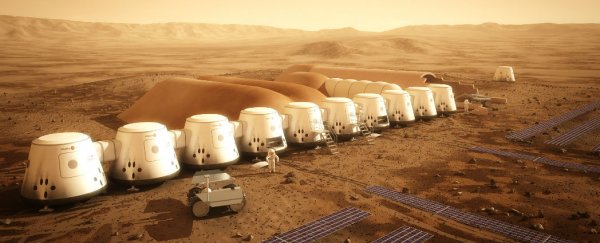The second man to walk on the Moon is now working on "a master plan" for colonising Mars within the next 25 years. Buzz Aldrin is teaming up with the Florida Institute of Technology to figure out how we can make the planet habitable by 2040, via the efforts of a new Buzz Aldrin Space Institute set to open later this year.
Although he admits the schedule is "adjustable", Aldrin wants to see mankind on Mars by 2040, and specifically by 2039 (the 70th anniversary of his own walk on the Moon). Right now, NASA is working on getting to Mars by the mid 2030s, and Aldrin hopes the agency is going to take some of his ideas on board.
Aldrin, now 85, will serve as a research professor of aeronautics as well as a senior faculty adviser for the Buzz Aldrin Space Institute. Mars has been on his mind for many years: he's written a book on the topic, acquired several patents relating to space exploration, and conceived a Aldrin Mars Cycler spacecraft back in 1985 that could theoretically take people to and from Mars. The idea of the Cycler has been refined since then, but Aldrin says he's still thinking about how to make the visit possible.
However, he doesn't think there are going to be any return trips, at least not to begin with. "The Pilgrims on the Mayflower came here to live and stay," the former Apollo 11 astronaut told The Guardian. "They didn't wait around Plymouth Rock for the return trip, and neither will people building up a population and a settlement [on Mars]." His initial plans make use of the Mars moons, Phobos and Deimos, as stepping stones for astronauts travelling to the red planet.
As for Florida Tech, it says it wants to "support commercial and international development of lunar resources" to eventually establish a settlement on Mars. Two other US astronauts, Winston Scott and Sam Durrance, also work at the institute.
"Florida Tech has long been at the forefront of exploration - since the days of our founding in 1958, serving as the 'night school for missilemen' when America began the race for space at Cape Canaveral," added Florida Tech President and CEO Anthony J Catanese in a press statement. "Having Dr Aldrin build this new initiative at Florida Tech is indeed an honour. We look forward to meaningful collaboration as humankind's new vision for space unfolds."
Both private companies and government agencies are hard at work developing the technology to get us to Mars, but there's a lot more work to be done yet before the journey is going to be both feasible and safe. When the breakthrough does come though, Buzz Aldrin wants to be playing a part.
